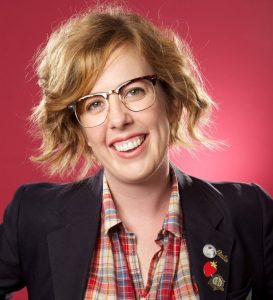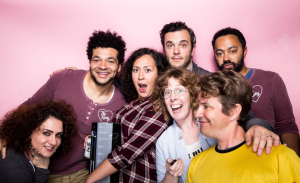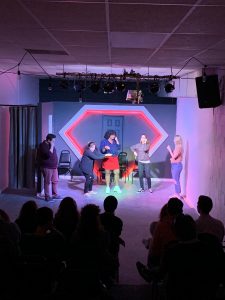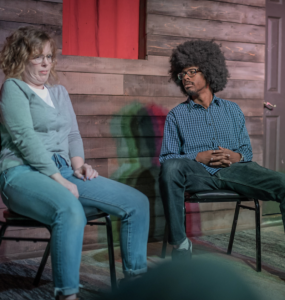
Just Lindsey being Lindsey.
I recently sat down with Lindsey Barrow (just kidding, I emailed her– it’s still a pandemic). She is the Artistic Director of The Ruby LA, an intersectional, feminist comedy theater in Los Angeles. Full disclosure, Lindsey and I are friends (although she prefers that I not say that in public or private). I think she is one of the unsung heroes of the improv community.
Lindsey Barrow has performed at various theatres including The Ruby, Nerdist, UCB, iO, and Second City doing stand-up, sketch comedy, and improv. She’s performed sketch and improv for over ten years and you can see her on shows like Speechless and Casual, and way too many commercials.
So The Ruby is an intersectional, feminist comedy theater. Can you tell us what that means and how you’ve implemented that philosophy?

Lindsey with her improv team, Karen.
Lindsey Barrow: Sure! Intersectional Feminism in comedy means we understand that a person’s comedy style will not only be influenced by their perspective of being a woman, or a black man, or a non-binary person. But, there are many areas of inequality that will determine a performer’s point of view, what they think is funny, or how they can function in society. We take all of that into consideration when we plan out our curriculum. We want you to be able to grow into the funniest person you think you can be, not the funniest person Randy thinks you should be. I mean, Randy’s funny and all… but like, he might not get a joke about tampons or pronoun mistakes.
What issues have you seen in the comedy community? What is The Ruby doing to help fix them?

Sketch Team “Rosa” performing at the Ruby
Please tell me more.
I worry that the necessary changes that need to be made will be forgotten because of the pandemic. Also, I’m worried about the onus for change being placed on BIPOC shoulders. Running a theater is hard work. It pays no money and maybe gets you a “thanks for your work” email like once every few months. Expecting BIPOC folks to open and run an expensive theater for themselves because white spaces aren’t doing better isn’t a great answer. Unless folks want to open up said theater, then they obviously should. I must warn you, it pays no money and the thank you emails are sparse, but they are nice.
Am I doing a good job? Feel free to tell me if I’m blowing this interview right now.
Lindsey Barrow: Who are you again? Have we met?

Lindsey, it’s me? Jeff?! We’ve been in several photos together.
I’m not sure if you heard about this, but a lot of theaters have been closed for months. How has your theater been weathering these crazy times?
What advice do you have to all of the actors and creatives who might be reading this?
Lindsey Barrow: Shit is very hard right now. If you are able to put any energy into writing, acting, and/or creating anything – you should be proud of yourself. And if you can’t, then you should go easy on yourself. Additionally, support institutions that are looking out for you! It’s hard for these places to enact change in the industry if everyone lets the status quo at these bigger theaters continue on. And just because you think there is one way to get your own hit TV show?!?! There are so many ways to get a hit TV show! Just ask Randy!

